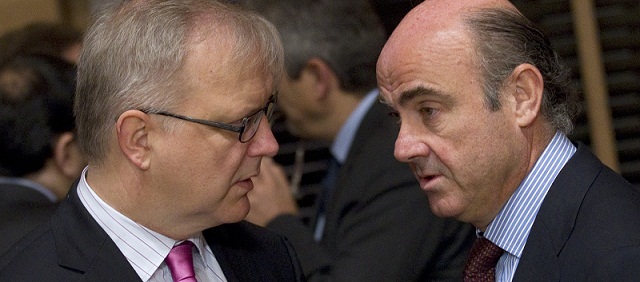Olli Rehn has openly acknowledged in appraising Spain’s performance that sticking to nominal fiscal targets can make little sense. That seems a huge concession for a herald of budgetary balance. Only a few days ago he feuded with Christine Lagarde wholeheartedly defending such a stance against the IMF fierce criticism.
But the undeniable dismal record this belt-tightening is reaping severely undermines its credibility. Forcing Greece to undertake out-of-reach efforts has led to utter economic discomfiture and default. Portugal is struggling to survive amid an awesome recession. Only Ireland has managed to escape from the austerity trap at a considerable cost. No wonder the Commission hesitates to plunge Spain into a similar ordeal. Moreover when other big economies like Italy and France might follow suit in the near future.
It doesn’t make sense to impose a blind fiscal consolidation path in the midst of a distressing downturn. Yet this is the official policy being currently enforced in the Euro zone. And Germany will flatly refuse to dismantle the fiscal compact it so forcefully managed to impose on its wavering partners, even confronted with such appalling evidence.
What lies behind Olli Rehn’s move? Is he inveigling Spain to buy a no-return ticket to rescue by providing the vague promise it won’t be saddled with new harsh requirements? Is he truly departing from entrenched fiscal orthodoxy? Both explanations may seem plausible so long as they reflect an improbable change of mood in Berlin.
Switching from budgetary targets to reform efforts can hardly match German views. Should Spain plunge into a rescue package it will be bound to abide to strict fiscal goals on top of an overall structural overhaul. It might end up trapped in a vicious circle of reinforced austerity and acute recession. Madrid might be confronted to a grim prospect should it take for granted Olli Rehn’s pledges. The more so as Merkel has shown a growing reluctance to foot a salvaging scheme for Spain.
Don’t bet either on a drastic switch in the current tight fiscal policy stance. Once Berlin has secured a firm commitment to budgetary balance it won’t relinquish this key lever to enforce enhanced euro governance. For all the Commission efforts to implement a more sensible policy there is little chance it will achieve any major breakthrough unless the current downturn badly hits Germany. Things are not likely to change regardless of Olli Rehn’s promising overtures.






Be the first to comment on "Is the EU finally backtracking on its tough fiscal stance?"